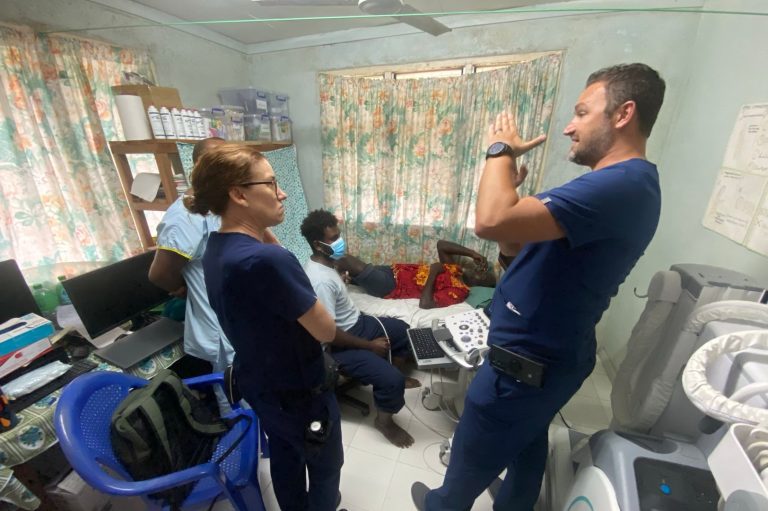The 1984th U.S. Army Hospital Pacific (USAH-P), 9th Mission Support Command Brigade, continued its Global Healthcare Engagement (GHE) in the Solomon Islands for two weeks in August 2024. The team was spread across the island nation, with a particular focus on Auki, Honiara, Gizo and Munda. In Munda, a small community on New Georgia Island, the highlight of the team was the installation of new ultrasound equipment, and Lt. Col. Richard Teams, 394th Forward Surgical Team’s Operating Room and Anesthesia Section Officer (OIC), played a key role in the effort.
Teams, an anesthesiologist from Dallas-Fort Worth, Texas, who is an ultrasound technology expert and consultant to the equipment manufacturer (Fujifilm), shared his experience setting up the equipment, working with the local medical team, and the profound impact the mission had on the local healthcare system.
“When we arrived in Munda, Dr. Ray told us that a brand new ultrasound machine had just arrived three days earlier,” Teams explains. “It had arrived in a big wooden box from Japan, and we helped the local health workers set it up.”
Over the course of several days, Teams and his team worked with local doctors and experts on various aspects of the ultrasound machine, including scanning techniques, probe use, and image management. Soon, there was an immediate need for the machine: Shortly after it was assembled, a local expert requested use of the ultrasound machine to examine a seriously ill premature baby.
“An ultrasound revealed a large amount of free air in the baby’s abdomen, which suggests a perforated intestine,” Teams recalled. “The fact that the new ultrasound allowed us to make such a rapid determination was crucial.”
A rapid diagnosis allowed the baby to be transferred in a timely manner to the National Referral Hospital in Honiara where he could receive appropriate treatment. In another instance, ultrasound was used to perform a nerve block on a patient with a severe diabetic infection.
“We worked with local physicians to develop an ultrasound-assisted nerve block technique that allowed us to perform the amputation without effective anesthesia or additional sedation,” Teams noted. “The nerve block provided pain relief for 22 hours after surgery.”
Teams highlighted the immense benefits that such medical equipment can bring to communities like Munda.
“The real challenge is not just owning advanced equipment, but knowing how to use it effectively,” Teams explained. “Ultrasound will have a significant impact on Munda’s medical capabilities, and continued use and training will be essential to realizing its full potential.”
Reflecting on his experience, Teams said he was deeply moved by the local community.
“The people of Munda are making the most of limited resources, which teaches us to be more frugal and to be grateful for what we have,” Teams said. “Building relationships with the people of Solomon Islands has been invaluable. They are extremely grateful for our efforts, and our presence has made a notable impact. Sustaining these medical missions and working alongside their medical professionals should be a priority for the Department of Defense.”
The mission to Munda not only highlights the importance of essential medical equipment but also the importance of exposure to such equipment to improve the efficiency of a particular medical community. Collaboration and support from such missions go a long way in improving healthcare outcomes in underserved areas.

